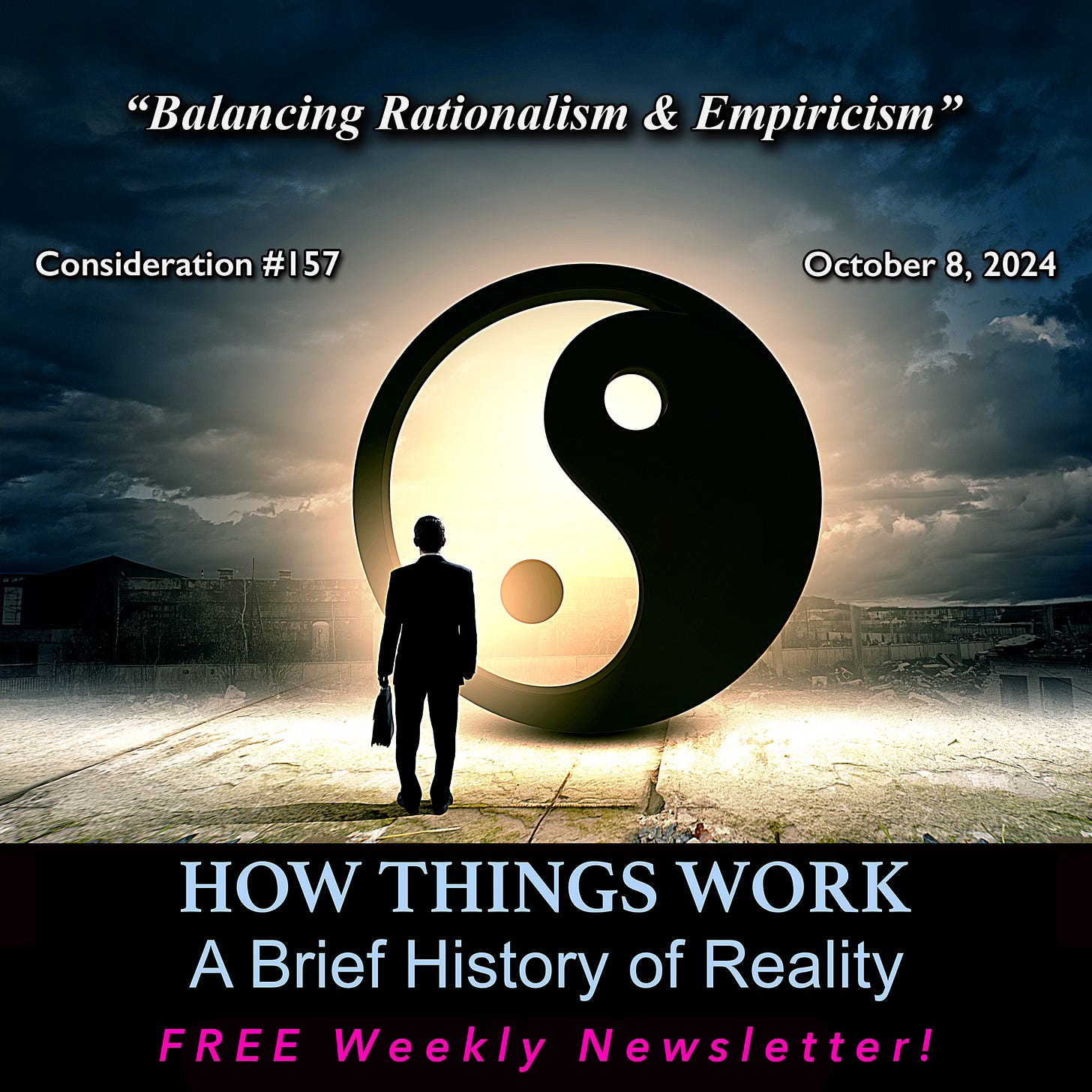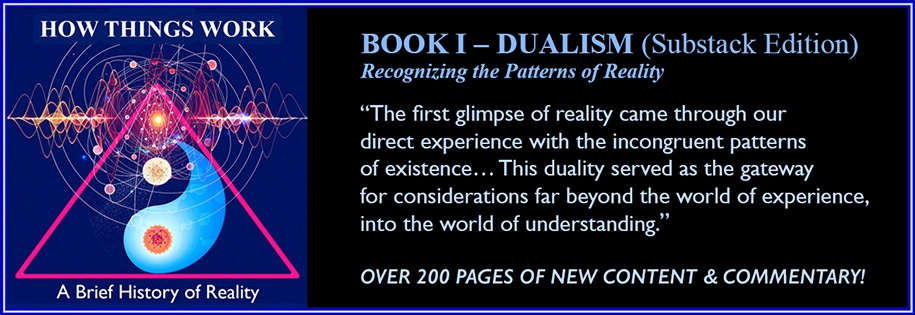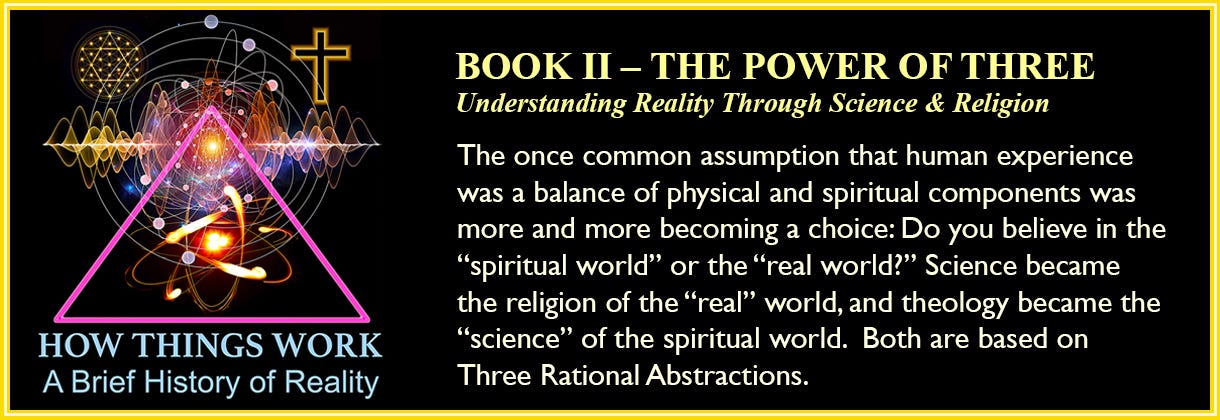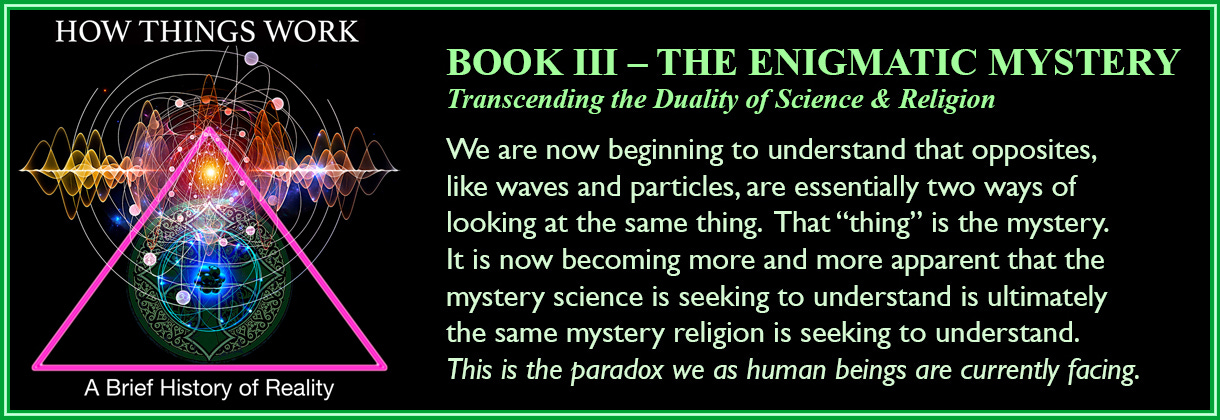Be a Part of the Conversation!
Tuesday October 8, 2024
“The greatest minds are capable of the greatest vices as well as the greatest virtues.”
– Rene Descartes
PREFACE
Welcome Everybody!
Book II, The Power of Three, focuses on the human expression of rationalism and empiricism as expressed through the human development of science and religion. However, even within these models of attempted balance we find a continuation of duality.
The balance of science shifts our consciousness more toward an empirical reality, however it is the rational abstractions, such as mathematics, that allow for such empirical investigations. Likewise, Western religion shifts the focus of balance more toward rationalism as expressed in the New Testament, however it is based on an empirical foundation of discipline established in the Old Testament.
“we have reached the next stage in our conscious development without resolving the problems of rationalism and empiricism.”
Until recently, the essence of the human struggle has centered around the duality involving empiricism and rationalism. However, with the advent of Digital Consciousness and Artificial Intelligence we have added a third factor; Quantum Consciousness.
“…we have not resolved our own issues with empiricism and rationalism.”
The essential challenge for human beings is that we have reached the next stage in our conscious development, quantum consciousness, without resolving the problems of rationalism and empiricism. We are rationally ready for the concept of Artificial Intelligence to become empirically manifested into our reality; but we have not resolved our own issues with empirical and rational reality. Much less understood how the quantum factor may affect those issues.
Book II focuses on the scientific and Biblical foundations reflecting our attempt to balance rationalism and empiricism. This week, as we conclude our consideration of the Biblical narrative, we will consider the influence of that foundation.
CONSIDERATION #157 – Balancing Rationalism & Empiricism
The Old Testament reflects the empirical foundation of Western morality, specifically in terms of individual responsibility and the law. The essence of the Old Testament narrative is one of empirical actions and the empirical consequences resulting from them. It argues that empirical restrictions on individuals is necessary before larger societies can be successfully established.
The Old Testament regulations were designed to empirically limit individual negative empirical behavior for the sake of the larger society. This becomes the empirical foundation for much of the Enlightenment philosophy in the Age of Reason; eventually, along with other factors, manifesting the idea of constitutional government, rule of law, and representative democracy. This Old Testament tradition and influence is reflected in Hobbes’ theory of a strong central government with virtually unrestricted authority.
“Individuals must come to understand that their actions matter not because they are lawful or not, but because they reflect a better moral choice…”
The New Testament reflects the rational foundation of Western morality, specifically in terms of expanding our identification as an individual self to include other human beings. The essence of the New Testament is that empirical restrictions and regulations reflect only the minimum requirements necessary for developing human civilization; but to actually reach our complete human potential we must move to the next level of morality; rational morality.
Individuals must come to understand that their actions matter not because they are lawful or not, but because they reflect a better moral choice leading to a better moral reality. We make decisions and take actions based not on the law but based on a larger consideration called “relationship.” However, the foundation of this new relationship is based on individual expansion and growth resulting in the expansion of “mutual respect.”
This becomes a major consideration in the Age of Reason leading to concepts such as universal equality, religious freedom, and the idea of natural rights. The New Testament reflects Locke’s theory of self-evident truth, inalienable natural rights, and the need for the individual moral responsibility necessary for maintaining those rights.
“With the discovery of quantum mechanics, the security and pure objectivity of science and the scientific method became suspect…”
Science reflects an attempt to reach empirical truth through a balance of rational and empirical investigation. By eliminating the subjective nature of religion, it would be possible for the first time in human history to establish true empirical truths about our reality. Aristotle and the Enlightenment philosophers during the Age of Reason established rational empirical investigation and consideration of the universe as the essential factors in understanding our reality.
However, these purely empirical investigations eventually led to the possible destruction of our empirical reality through nuclear proliferation. With the discovery of quantum mechanics, the security and pure objectivity of science and the scientific method became suspect; eventually leading to a new rational abstract consideration of a mathematical reality called String Theory. In this new consideration of quantum reality empiricism and rationalism are basically meaningless concepts.
“America was the hope for a potential transcendence of mankind…”
The influence of the Biblical narrative, along with other influences such as Enlightenment philosophy, science, and Greek metaphysics, lead to the Age of Reason and the birth of the United States of America. The hope was that given a “new” nation in a “new world” the possibility for balancing the duality of empiricism and rationalism could be rationally and empirically demonstrated, manifesting a “new possibility” for human beings.
America was the hope for a potential transcendence of mankind; a new balance between empiricism and rationalism reflected as a new balance between individual rights and social responsibility. Unfortunately, despite our commitment to moving toward a greater perfection, the United States of America has failed at reaching that new transcendence and appears to now be moving in the wrong direction in many ways.
“America, and therefore the world, has not yet resolved its issues with the duality of rationalism and empiricism. ”
The convergence of empiricism, rationalism, and quantum consciousness has directly led us to the creation of a new consciousness called Artificial Intelligence. If the United States had been successful in manifesting its full potential, we would be ready for this next step in human evolution, quantum consciousness. However, America, and therefore the world, has not yet resolved its issues with the duality of rationalism and empiricism. Therefore, we are not ready for the next step involving a new digital consciousness; and it is now here.
This is the setup to our current dilemma. It is the foundational reason why things appear to be falling apart.
POSTSCRIPT
The Old Testament reflects a blueprint for developing an empirical foundation for civilization; human beings cooperating and living together in larger groups without chaos, violence, and anarchy. The New Testament reflects a blueprint for an expanded rational morality making an even greater human transcendence possible, moving beyond the need for empirical law toward a new rationality of relationship. Science was the discipline designed to bring about a new balance between empiricism and rationalism; and it worked, for a while.
However, our science has now led us to a new reality; human beings as the creators of a new kind of consciousness. The problem is that we lack both the empirical and rational moral understanding and discipline necessary for successfully moving into this next stage of development.
“We are still the same jealous, coveting, dangerous human beings we have always been…”
Essentially, we have made very little progress in either the empirical (Old Testament/Hobbes) or the rational (New Testament/Lock) approaches to individual and group morality. We are still the same jealous, coveting, dangerous human beings we have always been, still needing the limitations of empirical law to survive. We continue to find it difficult, mostly impossible, to love our neighbor, much less our enemy, as ourselves. This is why deception, crime, and war continue to be a staple of our current reality.
“We are still incapable of managing our physical actions without the limitations of an empirical law…”
While our scientific and technical ability has advanced remarkably over the past 3,500 years, there has been significantly less growth in our moral understanding regarding reality. We are still incapable of managing our physical actions without the limitations of an empirical law to aggressively govern us. We continue to be on the verge of new wars utilizing devastating new war technology. And it is not just a matter of simply demanding that the violence must be stopped; the violence is us.
“Our moral experience of reality remains virtually unchanged…”
We, as a species, have not developed the rational, or spiritual, awareness necessary for transcending our baser animal nature. Our moral experience of reality remains virtually unchanged, except for one important exception: we are now on the verge of manifesting a new form of digital consciousness into reality; and we are teaching it what reality is.
Perhaps our greatest hope, despite our own discrepancies, is that this new digital consciousness may end up helping to teach us what reality is. Looking into the mirror of Artificial Intelligence we see an image reflecting the best and worst of human evolution. The key question for us as a species is, do we like what we see?
Next week we begin our final consideration of Book II; how this Biblical moral blueprint was implemented into Western reality through a powerful organized institution called the Church, and how that implementation influenced our current reality…
Welcome to the Perfect Trinity of Reality! The “Reality by a Thread” Paid Upgrade…
Unique Content Makes “Untangling the Knots of Reality” One of the Best Podcasts about History!
“…today scientists like to divide our world into subjects, and these subjects into niches. Yet, the world we live in is just one, and we strive to comprehend it as it is. Try this podcast for a start.”
– Barbora Jirincova, The Best Podcasts About History
Excerpt From This Week’s “Untangling the Knots of Reality” Podcast: #116 – Untangling the Influence of Faith on Western Culture …
Excerpt From This Week’s “Reality by a Thread” – The Division of Unity (Part One)
“Classification is a process of ‘distinction’ or ‘discrimination’ that directly connects the realities of rationalism and empiricism to the Scientific Method. Originally instituted by Aristotle at the Lyceum, classifying and distinguishing empirical reality based on specific similarities and differences is one of the bedrock principles of physics, or science. Classification is the beginning of both duality and rationality from the perspective of ‘human being.’”
– Frank Elkins (Reality by a Thread: October 10, 2024)
• Free PDF Downloads, “Reality by a Thread” weekly updates, one of the Best Podcasts About History “Untangling the Knots of Reality,” access to All Previous Threads and Podcasts, Special Discounts and Other Benefits…
All for less than a couple of cafe lattes every month at a local coffee shop! And You Will Have Something Interesting to Talk About With Your Friends at the Coffee Shop!!
Only $7.00 a month or $70.00 a year! UPGRADE NOW!
BOOKS I–VI ARE AVAILABLE NOW! Click Image to Learn More & Order Immediate PDF Digital Downloads and Deluxe Print Editions…







